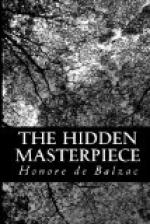“But why is it so, my dear master?” said Porbus humbly, while the young man could hardly restrain a strong desire to strike the critic.
“Ah! that is the question,” said the little old man. “You are floating between two systems,—between drawing and color, between the patient phlegm and honest stiffness of the old Dutch masters and the dazzling warmth and abounding joy of the Italians. You have tried to follow, at one and the same time, Hans Holbein and Titian; Albrecht Durier and Paul Veronese. Well, well! it was a glorious ambition, but what is the result? You have neither the stern attraction of severity nor the deceptive magic of the chiaroscuro. See! at this place the rich, clear color of Titian has forced out the skeleton outline of Albrecht Durier, as molten bronze might burst and overflow a slender mould. Here and there the outline has resisted the flood, and holds back the magnificent torrent of Venetian color. Your figure is neither perfectly well painted nor perfectly well drawn; it bears throughout the signs of this unfortunate indecision. If you did not feel that the fire of your genius was hot enough to weld into one the rival methods, you ought to have chosen honestly the one or the other, and thus attained the unity which conveys one aspect, at least, of life. As it is, you are true only on your middle plane. Your outlines are false; they do not round upon themselves; they suggest nothing behind them. There is truth here,” said the old man, pointing to the bosom of the saint; “and here,” showing the spot where the shoulder ended against the background; “but there,” he added, returning to the throat, “it is all false. Do not inquire into the why and wherefore. I should fill you with despair.”
The old man sat down on a stool and held his head in his hands for some minutes in silence.
“Master,” said Porbus at length, “I studied that throat from the nude; but, to our sorrow, there are effects in nature which become false or impossible when placed on canvas.”
“The mission of art is not to copy nature, but to represent it. You are not an abject copyist, but a poet,” cried the old man, hastily interrupting Porbus with a despotic gesture. “If it were not so, a sculptor could reach the height of his art by merely moulding a woman. Try to mould the hand of your mistress, and see what you will get, —ghastly articulations, without the slightest resemblance to her living hand; you must have recourse to the chisel of a man who, without servilely copying




